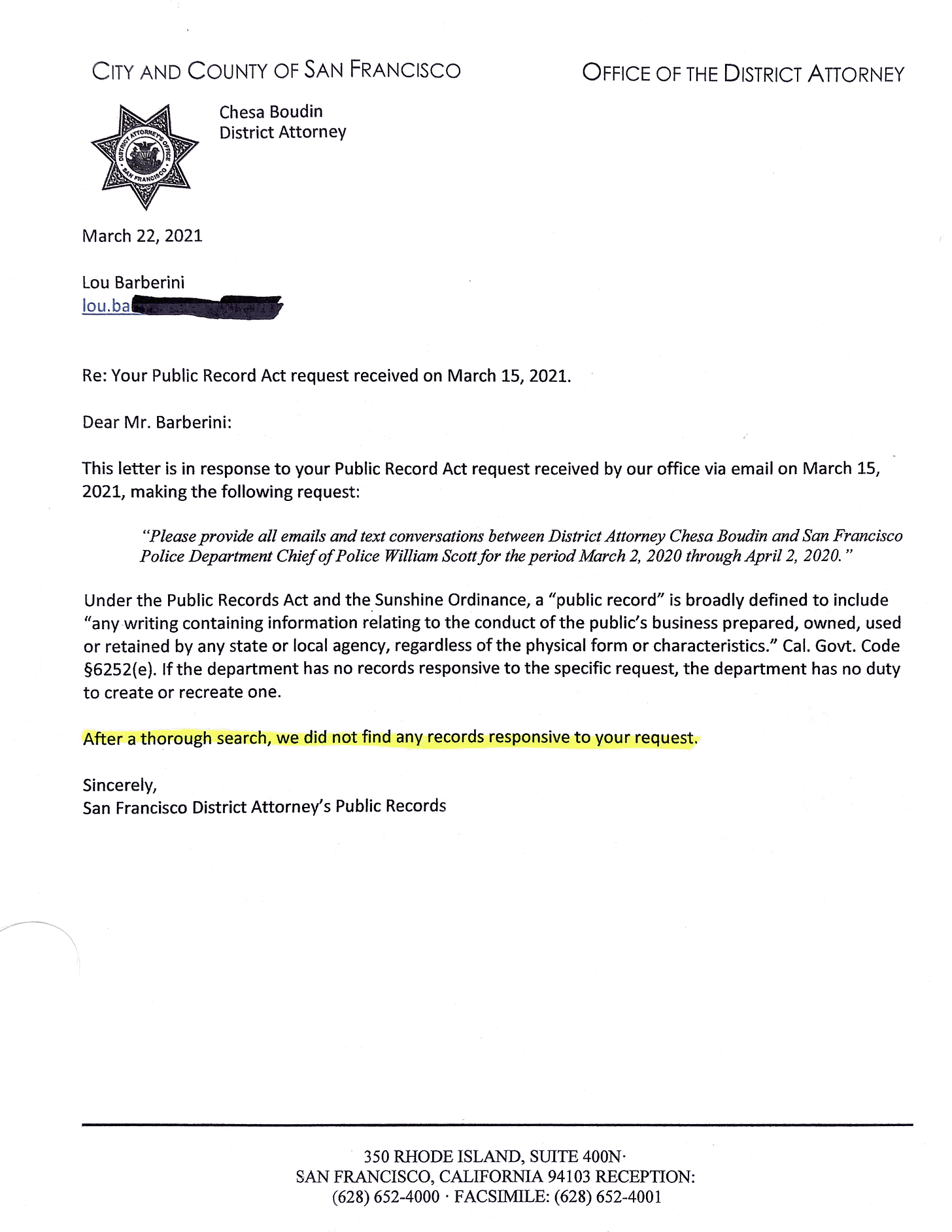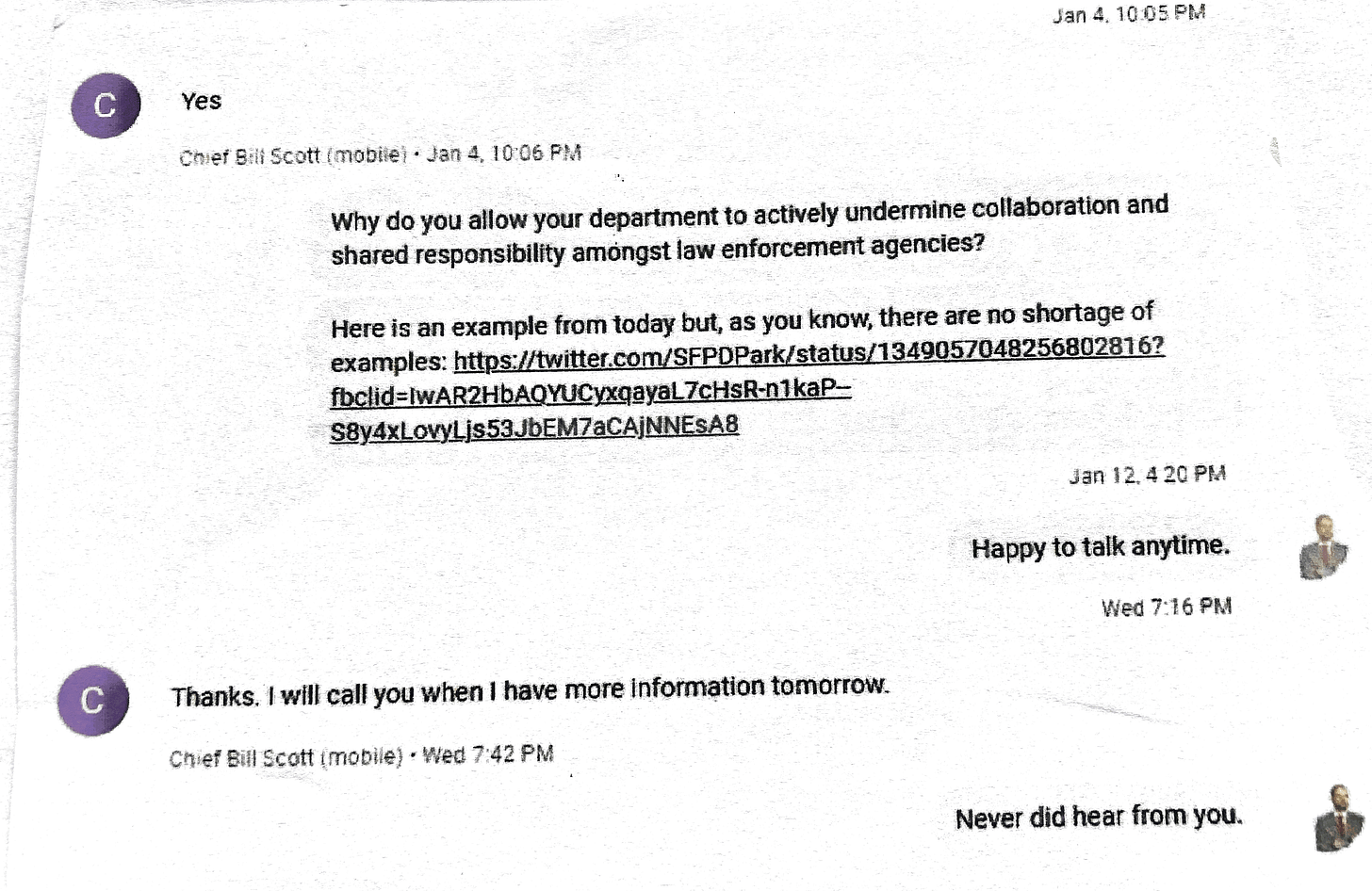“I need that tweet taken down. Now.”
DA Boudin’s March 31, 2021 text to Chief Scott demanding the removal of an SFPD Tweet
Over the past two years, I have followed District Attorney Chesa Boudin’s Twitter account. Frequently, Boudin’s verbatim Twitter posts resurface as the general talking points of the Mission Local, 48 Hills, or by the Chronicle’s Megan Cassidy. Those media publications also have reported statistics or details on criminal cases that are not public information. Other researchers have documented through public records searches that Boudin’s office has acted as a direct feeder of confidential and sealed information to the Washington Post.
Meanwhile, Chesa Boudin’s public records responses to my requests have been quite different. Thus, proving either my sources within the DA’s office have been inaccurate, or the DA’s office has been dishonest and violated the San Francisco Sunshine Ordinance.
How Boudin’s release of a violent criminal led to a retraction of an SFPD Twitter post
On a warm 2020 winter day, two Tenderloin Station bike cops stumbled upon a suspected dealer in possession of marijuana and an electronic scale used to weigh the contraband. The officers asked the salesman to sign a traffic ticket citation for the marijuana and a property receipt for the scale. The salesman signed one name on the citation, and hoping to get his scale returned, a different name on the property receipt.
The officers brought the salesman back to Tenderloin Station to conduct computer work to determine his true identity. But first, the salesman begged to hand his car keys off to his girlfriend. At the station, another officer recognized the salesman as the suspect in a video of a Tenderloin shooting from just a few hours earlier. This also potentially explained the salesman’s vehement appeal to ditch his keys—the gun might be stashed in the car.
The officers rode around the district until the salesman’s remote car key triggered a car’s indicator lights to go on. The officers then obtained a search warrant, authorized by a judge, to search the salesman’s car where they found the gun from the shooting.
It was a textbook arrest by SFPD as they removed a violent felon from the streets.
However, only 30-days later, the violent criminal was released back to the streets because Boudin feared he might catch Covid in County Jail. Literally, the decision to release the violent criminal subordinated the public’s risk of being struck by an indiscriminate gunman below the criminal catching the Covid virus in County Jail.
On March 29, 2020, Tenderloin station personnel voiced a factual accounting on Twitter:
Two days later, Tenderloin Station backpedaled on Twitter, while suspiciously copying the DA’s office:
Rumors spread through SFPD that Chief Scott had been pressured by Boudin to lower the tone of criticism on the DA’s policies, and specifically SFPD officers’ frustration with his releasing of the dangerous gunman back into the public.
Verifying the rumor: public records requests to Chief Scott and DA Boudin
To authenticate the rumor on DA Boudin’s pressuring Chief Scott, I issued separate public records requests to each of them with the intention of comparing their text and email responses to each other.
Boudin’s response came back within five-business days:
A month later, SFPD responded documenting that there were 40- texts that Boudin claimed did not exist, including:
Not only did SFPD’s response document that DA Boudin was dishonest in his public records response, but this also confirms the rumor that Boudin was pressuring Chief Scott to have officers retract their Twitter post about the DA’s policy of releasing violent custodies to the streets: “I need that tweet taken down. Now.” Nowhere in Boudin’s replies to Scott does he dispute the accuracy of Tenderloin Station’s tweets.
Boudin violated the Sunshine Act (again)
While it is possible that Boudin and his office will claim that they inadvertently overlooked the 40-texts exchange from the March/April 2020, what follows is another, apparently more intentional, Boudin violation of the Sunshine Act.
Through another public records requests, I asked for both Boudin’s and Scott’s texts to each other for the month of January 2021.
DA Boudin responded that he only had a 5-text exchange with Chief Scott between January 13th and January 21st:
However, Chief Scott’s response included five additional Boudin texts that were missing, and presumed intentionally deleted, from Boudin’s public records response:
Why did Boudin scrub the specific January 13th text: “the tweets contradict the incident report”? That text put no one at risk, nor revealed sensitive information, nor violated attorney/client privilege. Did Boudin only remove that text because it documents he was factually incorrect in his whining to Scott?
In the larger picture, we again see Boudin pressuring Scott to tone down SFPD personnel from notifying the community about the current level of crime. And by doing so, Boudin is stifling free speech and feeding an anti-law enforcement attitude that undermines SFPD’s ability to apprise the community of their successful efforts to address crime.
It is one thing to carelessly respond to a public records request and claim you inadvertently did not find your exchange of texts for a two-month period. It is quite another matter to select five texts from a string of texts and delete it from public view. The latter is forensic evidence of Boudin’s attempt to deceive the public on the consequences of his policies, and by doing so, intentionally violating the Sunshine Act— a misdemeanor criminal act!
Is Boudin using a disappearing encrypted text app?
While the above documents that Boudin has been dishonest about disclosing his texts required by the Brown Act, an issue has arisen whether Boudin has reverted to circumventing the same act by using the Signal text app, whereby his texts are encrypted and then disappear after a short time frame.
In the minutes of the Sunshine Task Force (File No. 20079 May 25, 2021), a petitioner had requested that Boudin’s cellphone be searched for the Signal texting app. Robyn Burke of the DA’s office never denied that Boudin was using Signal but said there were no records of texts on Signal. Of course, the fact Burke found no texts doesn’t clear Boudin, it just demonstrates the Signal app worked as expected by automatically deleting Boudin’s encrypted texts.
Disrespect for the First Amendment and his integrity issue
Over the past year, public records document that Boudin’s office leaked confidential information to the Washington Post in attempt to silence a journalist. We have also witnessed Chesa Boudin use his government Twitter account to follow and retweet posts from a fake juvenile’s Twitter account that was set up specifically to demonize the same journalist. With my disclosure of Boudin’s deleted texts, we now see how he has attempted to micromanage SFPD personnel’s release of public information.
It is hard to imagine that someone that monitors the details of SFPD’s tweets so closely, wouldn’t also be privy to the deletion of his own texts for a public records response. To Boudin, censoring what the public is informed about is more important than presenting his policies.
After Troy McAllister killed two innocent people on New Year’s Eve, attorneys in the DA’s office leaked to me that Boudin was linked to incriminating emails discussing the sweetheart deal he gave McAllister on his armed takeover robbery of a Mission grocery store. Boudin’s response to my public records request stated there was no such email exchange. In view of the above pattern of deceit, I think we must question the truthfulness of Boudin’s response on McAllister.
More Barberini articles here: https://gbtbnews.com/









I'm not sure which is more disturbing - Boudin's violations, or the fact that Chief Scott is such a toady.
God help us with both of these guys.